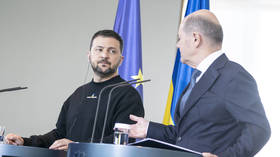‘Stop giving money to our refugees’ – Zelensky

Ukrainian President Vladimir Zelensky has called on the German government to abandon its policy of financially supporting Ukrainian refugees on its territory and divert the cash to Kiev instead. The scheme would make aid mechanisms more transparent, he argued in an interview with the public German broadcaster ARD over the weekend.
People who have fled Ukraine and moved to Germany currently receive financial assistance from both countries, Zelensky claimed in the interview, released on Monday by his administration. This needs to change, he insisted.
“It would be better if Germany supported Ukrainians by giving money to the budget of Ukraine,” the president said. He added that the government in Kiev would then distribute the funds, depending on each person’s whereabouts.
According to the Kiel Institute for the World Economy (IfW) – a major German think tank – Berlin spent almost €14 billion ($15.19 billion) on Ukrainian refugees between January 24, 2022 and October 31, 2023. Germany has become the second biggest donor to Ukrainian refugees – after Poland, which surpassed €15.6 billion ($16.93 billion) over the same period, according to IfW.
Zelensky’s plea comes as Kiev faces a crunch in its cash lifeline from Western backers. Last month, Ukrainian Prime Minister Denis Shmigal allegedly requested an emergency meeting with Western donors to discuss “exceptionally high uncertainty” over its budget, Bloomberg reported.
The finance ministry in Kiev said at the time that fiscal needs for 2024 were estimated at $37.3 billion, despite having received more than $42 billion in foreign aid last year. Finance Minister Sergey Marchenko also warned in December that Ukraine might suffer a deficit in the first two months of the year.
Ukraine has been rocked by a number of corruption scandals over the last few months, including some involving senior government officials. Earlier this month, the Ukrainian Defense Ministry revealed $262 million in military corruption-related costs, citing an internal audit. Transparency International recently ranked the country 104th out of 180 in its Corruption Perceptions Index report.
In mid-January, German outlet Der Spiegel weekly also reported that the government in Berlin was unsure where its military aid sent to Ukraine ended up. Berlin’s massive military assistance to Kiev was left unsupervised, as German policymakers relied on assurances from Kiev, the paper said.














